SWEET HONEY IN THE ROCK / “Oughta Be A Woman”
Sweet Honey In The Rock is the first family of women I learned to love unconditionally. Our traditional and contemporary works extend the categories in which we are placed. We are songwriters and poets, musical innovators and stalwarts, creative beings always looking for a truth to sing, pulling from the especially rich and myriad textures of our past and our present. We recreate the piercing and repetitive and determined tenor mating calls. We chant the harmonies of children at play. We hum the familiar refrains of the prescribed rituals of our societal upbringing. We shout the stark dissonances of war and racism. I love what this music does to my insides…. —Evelyn Maria Harris, long-time member of Sweet Honey In The Rock
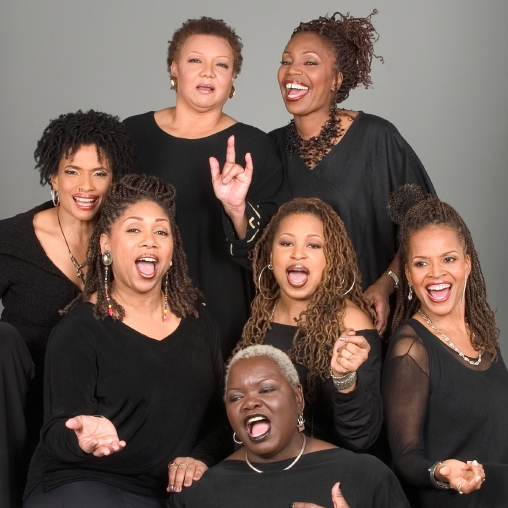 As a kid, I probably recognized the phrase ‘Sweet Honey In The Rock’ before I realized what it meant. I’m not talking about the metaphor, about the play-on-words of the old saying ‘you can’t get water from a stone.’ I’m not going even that deep with it. What I mean is, I didn’t consciously know Sweet Honey In The Rock was the name of a singing group. I’m not even sure I recognized the phrase as separate words. To me, the group’s name was just a series of sounds that had meaning, like ‘Ahidiana’ (the name of our school and community center), ‘habari gani’ (greetings) or ‘umoja’ (unity). To me, ‘sweethoneyintherock’ meant we were going to sing a song. Most likely, a bold, big-sounding song extolling the virtues of a great African or African-American—a Steven Biko, Harriet Tubman or Fannie Lou Hamer. Other favorites were “Ella’s Song,” which I thought of (and still do) as the ‘We Who Believe In Freedom’ song and “On Children,” Sweet Honey’s Kahlil Gibran adaptation that I can still sing every word of by heart although—until a couple weeks ago—I hadn’t heard it in over twenty years.
Two weekends ago, I drove to L.A. for my sister Kiini’s graduation ceremony. (She was receiving her second master’s degree—go, Kiini!!) On the way, I decided to listen to Selections 1976-1988, a 2CD set that compiles some of the musical highlights of Sweet Honey In The Rock’s first two decades or so. I hadn’t heard Sweet Honey’s music in years, so I expected my nostalgic reaction to their anthems—“Biko,” “Ella’s Song,” “On Children,” etc. What I didn’t expect was the subtlety and nuance of either of the two songs that really grabbed me, those being “Oughta Be A Woman” and “Sometime.”
I vaguely remember hearing “Oughta Be A Woman” as a child, but back then I couldn’t have understood what the song was really trying to say. As I cruised past the million-dollar cliff-side residences of San Juan Capistrano, I listened to those powerful, striking voices sing:
As a kid, I probably recognized the phrase ‘Sweet Honey In The Rock’ before I realized what it meant. I’m not talking about the metaphor, about the play-on-words of the old saying ‘you can’t get water from a stone.’ I’m not going even that deep with it. What I mean is, I didn’t consciously know Sweet Honey In The Rock was the name of a singing group. I’m not even sure I recognized the phrase as separate words. To me, the group’s name was just a series of sounds that had meaning, like ‘Ahidiana’ (the name of our school and community center), ‘habari gani’ (greetings) or ‘umoja’ (unity). To me, ‘sweethoneyintherock’ meant we were going to sing a song. Most likely, a bold, big-sounding song extolling the virtues of a great African or African-American—a Steven Biko, Harriet Tubman or Fannie Lou Hamer. Other favorites were “Ella’s Song,” which I thought of (and still do) as the ‘We Who Believe In Freedom’ song and “On Children,” Sweet Honey’s Kahlil Gibran adaptation that I can still sing every word of by heart although—until a couple weeks ago—I hadn’t heard it in over twenty years.
Two weekends ago, I drove to L.A. for my sister Kiini’s graduation ceremony. (She was receiving her second master’s degree—go, Kiini!!) On the way, I decided to listen to Selections 1976-1988, a 2CD set that compiles some of the musical highlights of Sweet Honey In The Rock’s first two decades or so. I hadn’t heard Sweet Honey’s music in years, so I expected my nostalgic reaction to their anthems—“Biko,” “Ella’s Song,” “On Children,” etc. What I didn’t expect was the subtlety and nuance of either of the two songs that really grabbed me, those being “Oughta Be A Woman” and “Sometime.”
I vaguely remember hearing “Oughta Be A Woman” as a child, but back then I couldn’t have understood what the song was really trying to say. As I cruised past the million-dollar cliff-side residences of San Juan Capistrano, I listened to those powerful, striking voices sing:
Washing the floors to send you to college Staying at home so you can feel safe… Biting her lips and lowering her eyes To make sure there’s food on the table… Hugging herself in an old kitchen chair She listens to your hurt and your rage…If I could’ve stopped in my tracks, I would’ve. It wasn’t just the lyrics that drew me in. It was also the arrangement of the voices. Instead of the multi-layered harmonies that Sweet Honey usually uses, “Oughta Be A Woman” was paced by a polyrhythmic groove kind of thing (all a cappella) that made it stand out from their other material. I was also digging the approach used by the lead vocalist. Her quiet authority reminded of the way your mother could sometimes stop you with a whisper. When she yells out loud at you to stop, you think, “I guess I’d better stop.” But when her voice drops way down low with that certain little undertone in it, there’s no thinking, you just stop. For me, hearing “Oughta Be A Woman” was like that. Whatever I was thinking about before it came on was just gone. I stopped. A few songs later, the voices broke into a tune named “Sometime.” I don’t recall having heard that one as a child even once. And no wonder: the tone is muted yet graceful; the lyrics are more tender implication than dramatic statement. I’m sure my parents played “Sometime” right along with the rest of the Good News album it originally comes from, but the sentiments expressed in the song are the kind of thing that means nothing to a nine-year-old child. They do however mean a whole hell of a lot to a once-divorced 34-year-old father. The song begins:
Sometimes day breaks in my life Sometimes the sun shines in my life Sometimes things work right in my life You are my sometime
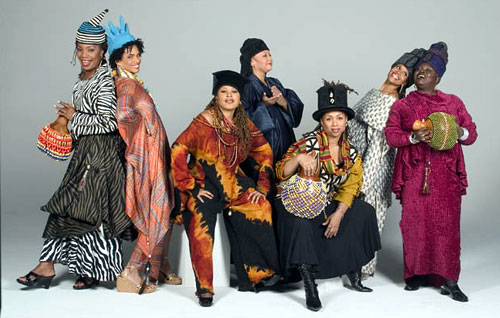 Before I heard these two songs, I thought of Sweet Honey In The Rock as tuneful and talented black women; as singers of anthems; as conjurers of pride, determination and beauty. But I also thought of their music as music of my past. As the type of thing that I was very, very happy to have grown up with it, but that I didn’t necessarily need in my life now. I’m both surprised and grateful to discover that the music of Sweet Honey In The Rock is much more varied than I thought it was. The Sweet Honey In The Rock catalog is not only inspiring and powerful (as I already knew), but sophisticated and subtle as well.
—Mtume ya Salaam
This music is my blood
Before I heard these two songs, I thought of Sweet Honey In The Rock as tuneful and talented black women; as singers of anthems; as conjurers of pride, determination and beauty. But I also thought of their music as music of my past. As the type of thing that I was very, very happy to have grown up with it, but that I didn’t necessarily need in my life now. I’m both surprised and grateful to discover that the music of Sweet Honey In The Rock is much more varied than I thought it was. The Sweet Honey In The Rock catalog is not only inspiring and powerful (as I already knew), but sophisticated and subtle as well.
—Mtume ya Salaam
This music is my blood
"We are warriors. Our songs sounds and lyrics give us stance - make clear the ground we hold. We name through our singing the territory of the expanding community we sound. When you see our songs, you see the tip of the mountain upon which we stand and it is solid ground." —Bernice Johnson Reagon “In Western formal choral tradition, there’s an aim for a blend so you cannot distinguish where the parts are coming from. With congregational singing, I could drive up to the church and they could be singing and I could tell you who was there, because the individual timbres of a voice never disappear. That congregational style is one of the things I think is important for democracy — the individual does not have to disappear, and it does not operate as an anticollective expression.” —Bernice Johnson ReagonI’m a certified, bona fide, live-to-die Coltrane freak. But you see these Sweet Honey womens, well, they is my blood. Flow thru me and can make me sit a spell and look at the air and see most of my life. The ups, the downs, triumphs and contradictions. See my baby children when these now-adults make me proud, or when I grieve for them/with them as they face their own personal dragons.
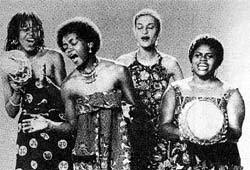 In general, people don’t have a clue of how difficult it was and remains for a collective of Black women to stand in righteousness. No sell out. No prostituting themselves, not even for survival’s sake, or worse, for the sake of success. I know the women of Sweet Honey aren’t haters or backbiters, but I’ve got to wonder what do they think of this generation of Black female singers whom seem intent on shamelessly showing-off (auctioning-off?) their naked skin more than their singing skills? I wonder if Beyoncé has ever heard Bernice!
Sweet Honey was born when our children were babies. 1973. Washington, D.C., when “Dee Cee” was a destination we rushed to because it was the new seat of our struggle. The homestead, the liberated zone, the healing circle. Yes, believe it or not, there was a time when Washington, D.C. made us proud. When Bernice Johnson Reagon and Sweet Honey were the soundtrack of our liberation movement struggle.
As young adults we cast our eyes to Africa, to China, the Caribbean, Chile, the whole planet. We became internationalists, but really were children of the sixties, the Civil Rights movement. SNCC (the Student Non-Violent Coordinating Committee). Specifically, for Sweet Honey it was the Albany Movement, and then the SNCC Freedom Singers.
In general, people don’t have a clue of how difficult it was and remains for a collective of Black women to stand in righteousness. No sell out. No prostituting themselves, not even for survival’s sake, or worse, for the sake of success. I know the women of Sweet Honey aren’t haters or backbiters, but I’ve got to wonder what do they think of this generation of Black female singers whom seem intent on shamelessly showing-off (auctioning-off?) their naked skin more than their singing skills? I wonder if Beyoncé has ever heard Bernice!
Sweet Honey was born when our children were babies. 1973. Washington, D.C., when “Dee Cee” was a destination we rushed to because it was the new seat of our struggle. The homestead, the liberated zone, the healing circle. Yes, believe it or not, there was a time when Washington, D.C. made us proud. When Bernice Johnson Reagon and Sweet Honey were the soundtrack of our liberation movement struggle.
As young adults we cast our eyes to Africa, to China, the Caribbean, Chile, the whole planet. We became internationalists, but really were children of the sixties, the Civil Rights movement. SNCC (the Student Non-Violent Coordinating Committee). Specifically, for Sweet Honey it was the Albany Movement, and then the SNCC Freedom Singers.
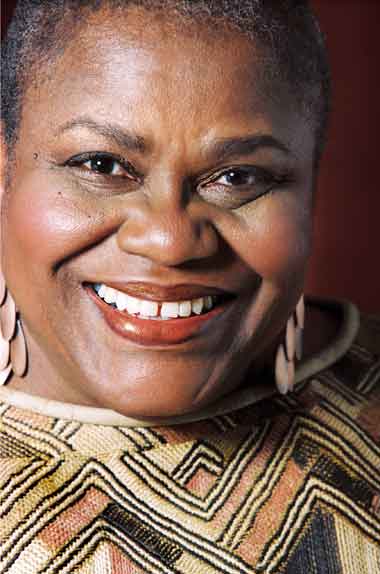 Bernice Johnson Reagon, who gave her head, heart and hands to the struggle, founded this society. And that is what Sweet Honey is: a society of singing women. Oh, those beautiful, best days of our lives. We were indeed the beautiful ones who (though we did not know it at the time) would spend the rest of our lives facing down ugliness.
Sweet Honey survived because they stayed in the center of the struggle. When the Civil Rights Movement waned and the Black Liberation Struggle dissipated, Sweet Honey became icons of the Women’s Movement, and were thusly able to sustain themselves even as former comrades and social support were failing and falling all around them. They persevered even though the eighties were not pretty.
The Civil Rights Movement boiled down to the sourness of Black politicians for whom the word “disappointment” is too good. Did we get our asses kicked, our bodies jailed and beaten, our sanity ruined, our families ties frayed and broken so that some Negro could turn his back on our people and shamelessly commit himself to the pursuit of white women and the illusionary green pastures of materialism and consumerism? Marian Berry may be a poster boy for political corruption but unfortunately he is but one of many, many, too many. Has anyone seen Colin Powell lately, seen our most precious male potential betraying itself, telling lies and carrying water for their masters only to end up discarded in ignominy?
Bernice Johnson Reagon, who gave her head, heart and hands to the struggle, founded this society. And that is what Sweet Honey is: a society of singing women. Oh, those beautiful, best days of our lives. We were indeed the beautiful ones who (though we did not know it at the time) would spend the rest of our lives facing down ugliness.
Sweet Honey survived because they stayed in the center of the struggle. When the Civil Rights Movement waned and the Black Liberation Struggle dissipated, Sweet Honey became icons of the Women’s Movement, and were thusly able to sustain themselves even as former comrades and social support were failing and falling all around them. They persevered even though the eighties were not pretty.
The Civil Rights Movement boiled down to the sourness of Black politicians for whom the word “disappointment” is too good. Did we get our asses kicked, our bodies jailed and beaten, our sanity ruined, our families ties frayed and broken so that some Negro could turn his back on our people and shamelessly commit himself to the pursuit of white women and the illusionary green pastures of materialism and consumerism? Marian Berry may be a poster boy for political corruption but unfortunately he is but one of many, many, too many. Has anyone seen Colin Powell lately, seen our most precious male potential betraying itself, telling lies and carrying water for their masters only to end up discarded in ignominy?
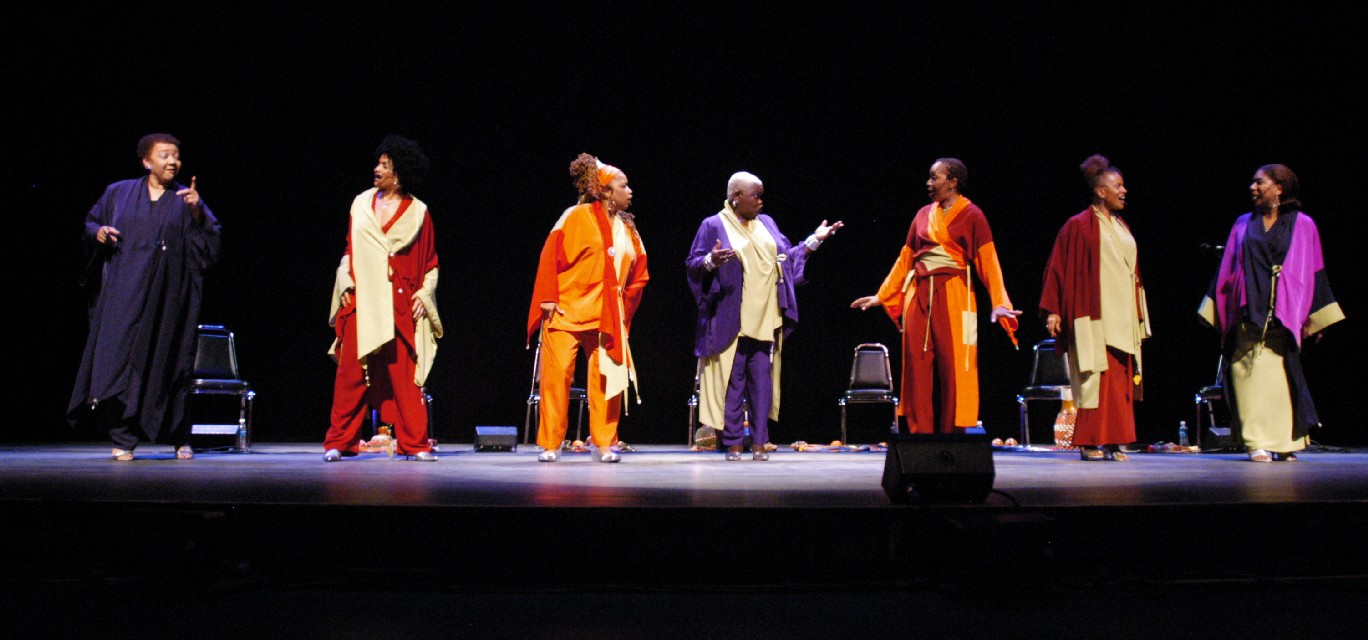 Hail Sweet Honey. Hail our sisters who stayed on the battlefield. Sweet Honey in the Rock, steadfast as Sirius in our night skies. And beyond the political, Sweet Honey demonstrated an unmatched commitment to elevating the folk aesthetic—the tradition of Great Black Music. Drawing on all the great tributaries, they crafted a distinctive sound that embraced the whole of our people’s voices. (Go here for a comprehensive overview of Sweet Honey recordings.)
Mtume, when you surprised me by dropping Sweet Honey, I became sentimental. This is the music you and your siblings drank while you breastfed. These were the lyrics we used to prepare y’all as children to join us (who were then ourselves but a few scant years past teen-age) when we went to face down the Klan, when we marched against Apartheid, when we confronted police brutality. These were the songs we taught y’all to sing in our schools, those independent Black educational institutions we opened and operated, determined to teach our children not to be as ignorant as we were.
As you can imagine, I could go on and on. Bernice is a personal friend, has visited our home. In the seventies, when our organization produced national Black Women’s Conferences we presented Sweet Honey in the Rock. It’s too much…. I’ve selected some tracks. They are the sound of my blood flying thru the decades of 20th century Black resistance and struggle to make this world better and more beautiful than when we arrived. Harambee. Harambee. Harambee. Harambee. Harambee. Harambee. HARAMBEEEEEEE!!!!!!!
—Kalamu ya Salaam
PS: If you are completely new to Sweet Honey in the Rock, I recommend you get Selections 1976 – 1988 and Breaths, both of which are compilation albums that will in turn lead you into the broad catalogue.
“Alla That’s All Right, But,” “Listen To The Rhythm,” “We All … Everyone of Us” are on Breaths (Flying Fish – 1989)
“Fulani Chant,” “See See Rider,” “(Women Should Be) A Priority” are on In This Land (Earthbeat – 1992)
“Are My Hands Clean?” “Letter To Dr. Martin Luther King” are on Live At Carnegie Hall (Flying Fish – 1988)
“Ella’s Song,” “In The Upper Room,” “On Children,” “Oughta Be A Woman,” “Seven Principles,” “Sometime” are on Selections 1976-1988 (Flying Fish – 1997)
“A Tribute” is on Still On The Journey (Earthbeat – 1993)
Hail Sweet Honey. Hail our sisters who stayed on the battlefield. Sweet Honey in the Rock, steadfast as Sirius in our night skies. And beyond the political, Sweet Honey demonstrated an unmatched commitment to elevating the folk aesthetic—the tradition of Great Black Music. Drawing on all the great tributaries, they crafted a distinctive sound that embraced the whole of our people’s voices. (Go here for a comprehensive overview of Sweet Honey recordings.)
Mtume, when you surprised me by dropping Sweet Honey, I became sentimental. This is the music you and your siblings drank while you breastfed. These were the lyrics we used to prepare y’all as children to join us (who were then ourselves but a few scant years past teen-age) when we went to face down the Klan, when we marched against Apartheid, when we confronted police brutality. These were the songs we taught y’all to sing in our schools, those independent Black educational institutions we opened and operated, determined to teach our children not to be as ignorant as we were.
As you can imagine, I could go on and on. Bernice is a personal friend, has visited our home. In the seventies, when our organization produced national Black Women’s Conferences we presented Sweet Honey in the Rock. It’s too much…. I’ve selected some tracks. They are the sound of my blood flying thru the decades of 20th century Black resistance and struggle to make this world better and more beautiful than when we arrived. Harambee. Harambee. Harambee. Harambee. Harambee. Harambee. HARAMBEEEEEEE!!!!!!!
—Kalamu ya Salaam
PS: If you are completely new to Sweet Honey in the Rock, I recommend you get Selections 1976 – 1988 and Breaths, both of which are compilation albums that will in turn lead you into the broad catalogue.
“Alla That’s All Right, But,” “Listen To The Rhythm,” “We All … Everyone of Us” are on Breaths (Flying Fish – 1989)
“Fulani Chant,” “See See Rider,” “(Women Should Be) A Priority” are on In This Land (Earthbeat – 1992)
“Are My Hands Clean?” “Letter To Dr. Martin Luther King” are on Live At Carnegie Hall (Flying Fish – 1988)
“Ella’s Song,” “In The Upper Room,” “On Children,” “Oughta Be A Woman,” “Seven Principles,” “Sometime” are on Selections 1976-1988 (Flying Fish – 1997)
“A Tribute” is on Still On The Journey (Earthbeat – 1993)
This entry was posted on Sunday, July 23rd, 2006 at 12:23 am and is filed under Classic. You can follow any responses to this entry through the RSS 2.0 feed. You can leave a response, or trackback from your own site.
5 Responses to “SWEET HONEY IN THE ROCK / “Oughta Be A Woman””
July 23rd, 2006 at 12:50 pm
I’m so glad you chose “A Tribute”. I love this song. I have a friend of mine who is in his 80’s and can’t stand rap. I gave him the 20th Anniversary CD in hopes that he’d hear the reggae-like toasting in the song, mixed with the spirituals. I haven’t heard back from him yet, but I’m hoping he’ll dig this.
Peace!! and you know, I saw you (Kalamu) in a photo of Sonia Sanchez. Why don’t you put up her powerful poem “I’m Gonna Stay on the Battlefield” sometime?
Thanks.
Chris
July 26th, 2006 at 4:45 am
This post–the music AND what you have written–are manna. We are starving for this.
Thank you.
one love,
Ekere
July 26th, 2006 at 10:30 am
I’m cryin. I’m cryin. I’m cryin cuz of memories, cuz of my passion that drove those memories. I’m cryin cuz I was part of an a capella group here in New Orleans called Cultural Voices that sang the songs from Sweet Honey in the Rock, songs that caused us and our listeners to levitate, reminding us of our unique, single gifts only we African/African-Americans have to give to humanity. I’m cryin. I’m cryin cuz of the courage and contributions of we African/African-American women to create a way out of no way, to point to ways unseen, to carry on in the face of seemingly insurmountable odds. Today the words of "Ella’s Song" travel with me cuz I be moved to sing it or am asked to sing it in just bout any gathering. I’m cryin cuz I yearn, deeply desire a world filled with peace, justice and equality for every individual. And still, I stand some 30-plus years latuh for that call for resistance. My tears are rich with pride for bein one of the steady strivers who knows the perpetual reality of transformation.
July 29th, 2006 at 5:39 pm
Ashe to you, Sister. I think we are all crying the same tears.
one love,
Ekere
October 13th, 2008 at 10:56 am
wow, it was amazing songs and is there anyone sign language at the same time singing? i saw a girl use hand "i love you" in sign language. actucally im deaf girl:)
kalamu sez
yes, a personh who signs is a member of the ensemble and translates at all of their concerts.
Leave a Reply
| top |